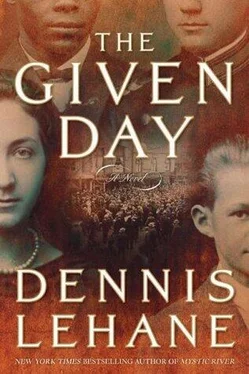“It’s Babe Ruth!” someone called, and several people pointed and called his name. Out on Fifth Avenue, half a dozen cars honked their horns.
He looked back at the couple in the taxi line. It sure was cold. For a moment he thought of calling to them, offering them a ride to their hotel. But they weren’t even looking his way. Manhattan was cheering him, honking horns, yelling “Hurrah,” but this couple heard none of it. They were turned into each other, the ex-copper’s coat wrapped around her to protect her from the wind. Babe felt forlorn again, abandoned. He feared he’d somehow missed out on the most elemental part of life. He feared that this thing he’d missed would never, ever, enter his world. He dropped his gaze from the couple and decided they could wait for a taxi. They’d be fine.
He climbed into the car and rolled down the window to wave at his new fans as the driver pulled away from the curb. Volstead was coming, but it wouldn’t affect him much. Word was the government hadn’t hired nearly the manpower needed to enforce it, and Babe and people like him would be allowed certain exemptions. As they always had. That was the way of things, after all.
Babe rolled the window back up as the car accelerated.
“Driver, what’s your name?”
“George, Mr. Ruth.”
“Ain’t that a kick? That’s my name, too. But you call me Babe. Okay, George?”
“You betcha, Babe. An honor to meet you, sir.”
“Ah, I’m just a ballplayer, George. Can’t even read good.”
“But you can hit, sir. You can hit for miles. I just want to be the first to say, ‘Welcome to New York, Babe.’”
“Well, thank you, George. Happy to be here. Gonna be a good year, I think.”
“A good decade,” George said.
“You can say that twice.”
A good decade. So it would be. Babe looked out the window, at New York in all its bustle and shine, all its lights and billboards and limestone towers. What a day. What a city. What a time to be alive.
A City in Terror by Francis Russell is the authoritative account of the Boston police strike and its aftermath. It was an invaluable resource.
Other source material included The Great Influenza by John M. Barry; Babe: The Legend Comes to Life by Robert W. Creamer; The Burning by Tim Madigan; Reds by Ted Morgan; Standing at Armageddon by Nell Irvin Painter; Dark Tide by Stephen Puleo; Babe Ruth: Launching the Legend by Jim Reisler; Perilous Times by Geoffrey R. Stone; The Red Sox Century by Glenn Stout and Richard A. Johnson; The Year the Red Sox Won the World Series by Ty Waterman and Mel Springer; Babe Ruth and the 1918 Red Sox by Allan Wood; and A People’s History of the United States by Howard Zinn.
A thousand thanks to Leonard Alkins, Tom Bernardo, Kristy Cardellio, Christine Caya, John J. Devine, John Dorsey, Alix Douglas, Carla Eigen, Mal Ellenburg, Tom Franklin, Lisa Gallagher, Federica Maggio, William P. Marchione, Julieanne McNarry, Michael Morrison, Thomas O’Connor (the dean of Boston historians), George Pelecanos, Paula Posnick, Jr., Richard Price, Ann Rittenberg, Hilda Rogers, Henry F. Scannell, Claire Wachtel, Sterling Watson, and Donna Wells.
Lastly, a particular debt of gratitude is owed to U.S. Army Sergeant Luis Araujo, whose selflessness and heroism lit the necessary fires.












